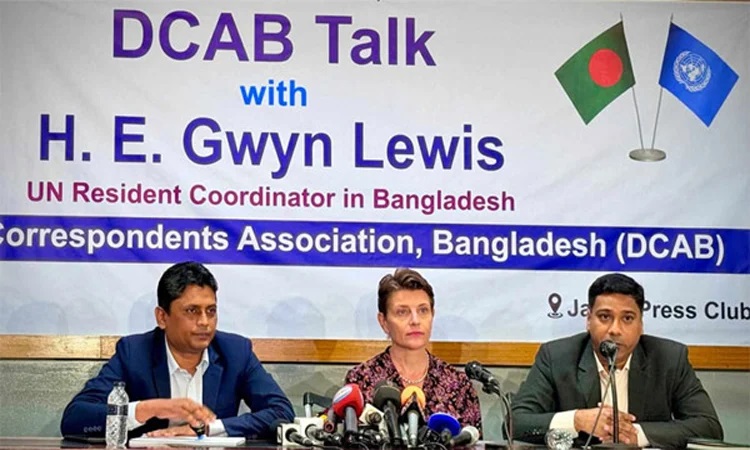The United Nations has clarified it is not participating in establishing a humanitarian corridor through Bangladesh to Rakhine, with UN Resident Coordinator Gwyn Lewis explaining that while the Bangladesh government is pursuing the initiative, it remains a bilateral matter requiring formal agreement between the two sovereign states.
Speaking at a “DCAB Talk” event organised by the Diplomatic Correspondents Association, Bangladesh (DCAB) at the National Press Club on Wednesday, Lewis emphasised that any cross-border arrangement to aid conflict-affected people requires formal consent from both Bangladesh and Myanmar governments. She noted the UN could potentially assist if an agreement materialises, but confirmed no such deal currently exists.
Regarding the Rohingya crisis, Lewis described access to Rakhine as extremely difficult due to ongoing conflict, while confirming an existing UNHCR-UNDP memorandum with Myanmar for limited aid operations. She acknowledged growing challenges in securing funding for Rohingya refugees and shared that displaced people continue expressing desire for dignified repatriation, though conditions in Rakhine remain unstable.
On the subject of inclusive elections, Lewis outlined UN standards, explaining that genuine inclusivity ensures participation from all societal segments including women, ethnic minorities, religious groups and youth. When pressed about banning political parties, she maintained the UN’s neutral position, stating such decisions remain sovereign matters while reiterating the organisation’s general advocacy for participatory politics without endorsing specific parties.
Addressing Bangladesh’s political climate, Lewis warned that excluding parties risks increased polarisation and instability. She declined to comment specifically on Awami League or BNP’s political status, reasserting the UN’s non-partisan role in domestic politics. The UN official clarified the organisation has no mandate in election scheduling, describing it as a domestic political decision entirely.
These remarks follow recent UN Human Rights Council reports from July-August that emphasised the importance of inclusive elections. Lewis elaborated that true inclusivity means ensuring voting access for all citizens regardless of gender, ethnicity, or religion, with particular attention to removing barriers for marginalised groups. The discussion highlighted the UN’s position that while it encourages broad participation in electoral processes, actual implementation depends on national contexts and decisions by local stakeholders.


